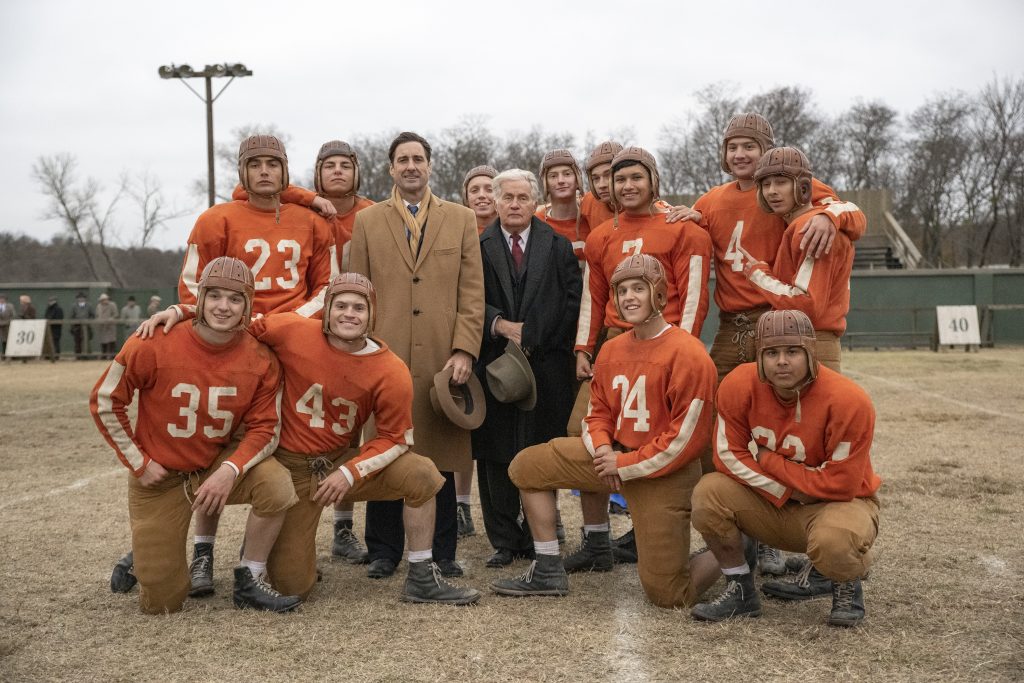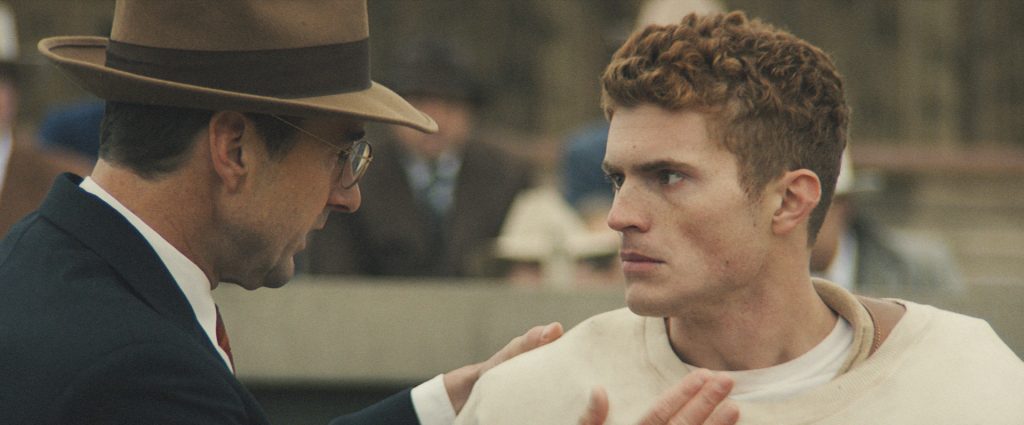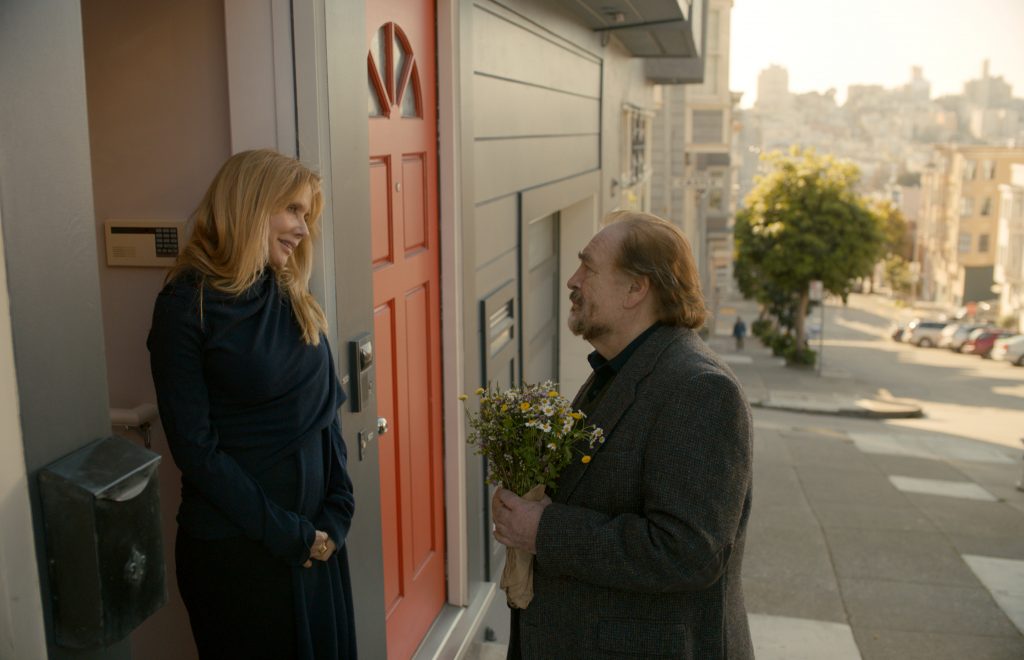June 18, 2021
by Carla Hay

Directed by Ty Roberts
Culture Representation: Taking place in 1938, mainly in Fort Worth, Texas, the dramatic film “12 Mighty Orphans” (based on a true story) features a predominantly white cast of characters (with a few Latinos) representing the working-class, middle-class and wealthy.
Culture Clash: A high school football coach begins working at an orphanage, where he assembles a ragtag team of teenage football players, who must fight for respect and overcome several obstacles in football and in life.
Culture Audience: “12 Mighty Orphans” will appeal primarily to people who are interested in traditionally made “against all odds” sports movies.

Unapologetically sentimental and earnest, the dramatic film “12 Mighty Orphans” is the type of movie that embraces its hokey tropes and ends up being a charming story. Most of the movie is utterly predictable, because there are so many underdog sports movies that have covered the same territory in a similar way. Somehow, it all works well for “12 Mighty Orphans,” which tells the true story of the Mighty Mites, a Texas orphanage football team that defied low expectations to go all the way to the Texas state championships.
People who already know this story probably won’t learn anything new, but this dramatic depiction is still compelling, thanks to commendable performances from the cast members. Directed by Ty Roberts (who co-wrote the “12 Mighty Orphans” screenplay with Lane Garrison and Kevin Meyer), “12 Mighty Orphans” is based on Jim Dent’s 2008 non-fiction book “Twelve Mighty Orphans: The Inspiring True Story of the Mighty Mites Who Ruled Texas Football.” The movie (which had its world premiere at the 2021 Tribeca Film Festival in New York City) hits a lot of the same beats as other inspirational sports movies about underdogs.
There’s the coach who ignores the naysayers, motivates his team, and turns them into winners. There’s the talented but hotheaded team member who lets his temper get in the way of his sportsmanship. There’s the sneering coach from another team who can’t believe these ragamuffins could possibly be better than his team.
The movie, which takes place in 1938 during the Great Depression, begins with the introduction of Harvey Nual “Rusty” Russell (played by Luke Wilson), who has left a comfortable teaching position at a high school to take a teaching/coaching job at the Masonic Home, an orphanage in Fort Worth, Texas, that has about 150 children in residence. Rusty has moved with his loyal wife Juanita Russell (played by Vinessa Shaw) and their two children: Betty Russell (played by Josie Fink and Lillie Fink), who’s about 4 or 5 years old, and another unnamed daughter, who’s about 6 or 7 years old.
Juanita, who will be teaching English at the orphanage, isn’t happy about this move because Rusty took this job without even discussing it with her. Rusty will be teaching math at the orphanage, but his true passion is coaching football. The orphanage’s doctor A.P. “Doc” Hall (played by Martin Sheen) recommended Rusty for the job, but Doc and Rusty don’t meet in person until Rusty and his family arrive on the premises. Doc is also a football enthusiast, and he becomes Rusty’s biggest ally at the orphanage. Doc also serves as the movie’s voiceover narrator.
To his shock and dismay, Rusty finds out that not only does the orphanage not have a formal football team but the orphanage also don’t have football uniforms. Doc also says that when the orphans do play footbal, they play during two seasons: One season where they can wear shoes, and they other where they don’t wear shoes. The orphanage is so financially strapped that there aren’t enough athletic shoes to last an entire year. Despite these obstacles, Rusty is determined to put a football team together and have the team compete with high school football teams in the league.
Rusty gets resistence from the orphanage’s corrupt chief administrator Frank Wynn (played by Wayne Knight), who physically and verbally abuses the male orphans. (Frank has a large paddle named Bertha, and he doesn’t hesitate to use it.) Frank also forces the male teenagers to work in an orphanage sweatshop to make garments and shoes that he sells for his own personal profit. Needless to say, the sweatshop work violates all types of child labor laws.
Frank thinks that the male teens in the orphanage shouldn’t be playing competitive football because he thinks the time spent on practice and games should be used for his grueling sweatshop work. However, Frank is overruled by his boss, who tells Rusty that Rusty can put together a football team, under one condition: “It’s very important that it does not interfere with the day-to-day [activities] of the home.”
Through a process of elimination (some of the boys don’t qualify for the team because of low grades), 12 teens (whose average age is 16 to 17) join the football team. They call themselves the Mighty Mites. The 12 members of the team are:
- Hardy Brown (played by Jake Austin Walker), an angry young man who becomes the team’s star linebacker
- Wheatie “C.D.” Sealey (played by Slade Monroe), who comes out of his bashful shell to become the team quarterback
- Douglass “Fairbank” Lord (played by Levi Dylan), the pretty boy of the team
- Leonard “Snoggs” Roach (played by Jacob Lofland), a foul-mouthed jokester
- Leon Pickett (played by Woodrow Luttrell), an introvert
- Miller Moseley (played by Bailey Roberts), the smallest player on the team
- Cecil “Crazy” Moseley (played by Michael Gohlke), Miller’s brother who happens to be mute
- Amarante Pete “A.P.” Torres (played by Tler Silva), who doesn’t say much in the movie
- Gonzolo “Carlos” Torres (played by Manuel Tapia), who is A.P.’s brother
- DeWitt “Tex” Coulter (played by Preston Porter), the tallest person on the team
- Ray Coulter (played by Austin Shook), Tex’s brother
- Clyde “Chicken” Roberts (played by Sampley Barinaga), a redhead who overcomes his fears to become a solid team player
Abusive orphanage administrator Wayne is the story’s biggest villain, but the movie also has other antagonists. Luther (played by Lane Garrison) is a cigar-chewing, arrogant businessman who has invested in a rival football team. He’s dead-set against letting the Mighty Mites play in the high school football league because he thinks the orphanage isn’t a legitimate school. “Orphan football,” Luther sasy to himself disgust. “That’s as dumb as letting women vote.”
During a football league hearing to decide whether or not the Mighty Mites can compete against other high school football teams, Luther objects because of the rule that a competing school must have at least 500 students. However, Rusty has found a clause in the rulebook that can make an exception for a team if the coaches of the other high schools give a majority vote to allow the team. Rodney Kidd (played by Scott Haze), who happens to be Luther’s brother-in-law, is presiding over the hearing.
Luther thinks that his family connection will give him an easy advantage in this battle. But to Luther’s anger and disappointment, the coaches of the other high schools vote by a majority to let the Mighty Mites compete in the league. It can be presumed that these other coaches probably thought that these orphans would be easy to defeat in football games, so that’s why they readily allowed the Mighty Mites into the league.
But as what happens in underdog stories like this one, the Mighty Mites were severely underestimated. They start winning games and become folk heroes. The team attracts the attention of businessman Mason Hawk (played by Robert Duvall, in a small role), who invests in the Mighty Mites. (“Apocalypse Now” co-stars Sheen and Duvall have a scene together in “12 Mighty Orphans.”) Later in the story, President Franklin Roosevelt (played by Larry Pine) becomes a Mighty Mites fan. Treat Williams has a small role as Amon Carter, founder/publisher of the Fort Worth Star-Telegram.
And every underdog story seems to have emotional baggage and trauma. Hardy is a very talented football player, but he has an explosive temper that can get him into trouble. Why is he so angry? Before he came to the orphanage, he was found lying next to his dead father (who was murdered), and Hardy’s mother didn’t want to take care of Hardy, so she sent him to live in the orphanage.
C.D. also has a mother who abandoned him at the orphanage, when he was 7 years old, after C.D.’s father left the family. C.D. hasn’t seen his mother in the 10 years since then. When C.D. mother’s Wanda (played by Lucy Faust) unexpectedly shows up at the orphanage with her current husband, it leads to an emotionally raw confrontation that’s very melodramatic, but it fits well in this often-melodramatic movie.
Doc, who is a widower, has his own personal demons: He’s an alcoholic. And he confides in Rusty that his wife died during childbirth. Based on his tone of voice, Doc is still haunted by his wife’s tragic death. As for Rusty, he tells his football team during an emotional moment that he can relate to them because he’s an orphan too.
“12 Mighty Orphans” is the type of movie where Doc says in a voiceover about Rusty: “He knew that football would inevitably bring self-respect to the boys.” And there are plenty of “pep talk” scenes that are exactly what you would expect. As formulaic as this movie is, there’s still a level of suspense in the movie’s best game scene: the Texas state championship. Viewers who already know the game’s outcome can still be drawn in by the thrilling way that this game is filmed for the movie.
Rusty is portrayed by Wilson as an almost saintly mentor who never loses his temper, even when some of the boys on his team rudely insult him and each other. By contrast, Knight’s depiction of the loathsome Frank is almost a caricature of a villain. Out of all Mighty Mites, Walker (as Hardy), Monroe (as C.D.) and Lofland (as Snoggs) get the most screen time to showcase the characters’ personalities. All of the acting is believable, but sometimes hampered by corny dialogue.
“12 Mighty Orphans” was filmed on location in Texas, in the cities of Fort Worth, Weatherford and Cleburne. That authenticity goes a long way in this movie’s appeal, since so much of the film comes across as a made-for-TV movie. Is this movie going to be nominated for any awards? No, but it’s not a bad way to be entertained. And people don’t even have to be fans of American football to enjoy “12 Mighty Orphans.”
Sony Pictures Classics released “12 Mighty Orphans” in select U.S. cinemas on June 11, 2021, with an expansion to more cinemas on June 18, 2021.


